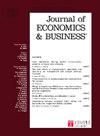Income Inequality in India: An Empirical Analysis of Changing Paradigms
IF 3.4
Q1 BUSINESS, FINANCE
引用次数: 0
Abstract
In this paper we have analysed economic inequality in India more specifically expressed in terms of income inequality in an empirical and historical frame. The period to which the analysis belongs is predominantly consists of the two phases, first the colonial period and second the post-independent era. The analysis for post independent India is presented in two phases, the planned economy period from 1950 to 1990 and the post reform economic policy regime from 1991 to 2020. We have presented in most precise and in brief the estimates of some of the most notable quantitative enquiries through empirical trends and patterns. We have also presented broad interpretations concerning the predominance of institutional and technical factors that govern and prolong the status of economic affluence in a society in congruence to specifically distinct historical phases signifying the primacy of these factors in determining the scope of production and exchange in the economy. The inferences drawn on the basis of the estimates of income distribution available at our disposal reflect high income inequality during much of the colonial period. Amidst the limitations, concerning the availability and the robustness of data, we find that self-determination in form of political freedom has the potential to generate and maintain conditions for greater economic equality which we observe during planned economic development in India. However this potential is limited by state of technology and optimized by institutional development concerning public goods within the broad purview of modern welfare state.印度的收入不平等:变化范式的实证分析
本文章由计算机程序翻译,如有差异,请以英文原文为准。
求助全文
约1分钟内获得全文
求助全文
来源期刊

JOURNAL OF ECONOMICS AND BUSINESS
BUSINESS, FINANCE-
CiteScore
6.20
自引率
2.60%
发文量
31
期刊介绍:
Journal of Economics and Business: Studies in Corporate and Financial Behavior. The Journal publishes high quality research papers in all fields of finance and in closely related fields of economics. The Journal is interested in both theoretical and applied research with an emphasis on topics in corporate finance, financial markets and institutions, and investments. Research in real estate, insurance, monetary theory and policy, and industrial organization is also welcomed. Papers that deal with the relation between the financial structure of firms and the industrial structure of the product market are especially encouraged.
 求助内容:
求助内容: 应助结果提醒方式:
应助结果提醒方式:


